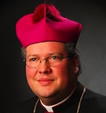
Prime Bishop Anthony Mikovsky
Give Thanks
- November 20, 2019
- , 4:02 pm
- , Prime Bishop Blog
“Put on then, as God’s chosen ones, holy and beloved, heartfelt compassion, kindness, humility, gentleness and patience, bearing with one another and forgiving one another, if one has a grievance against another; as the Lord has forgiven you, so must you also do. And over all these put on love, that is, the bond of perfection. And let the peace of Christ control your hearts, the peace into which you were also called in one body. And be thankful. Let the word of Christ dwell in you richly, as in all wisdom you teach and admonish one another, singing psalms, hymns and spiritual songs with gratitude in your hearts to God. And whatever you do, in word or in deed, do everything in the name of the Lord Jesus, giving thanks to God the Father through Him.” (Colossians 3:12-17)
When we were young children most of us were taught by our parents and other adult figures in our lives to have good manners in public situations. It is something that I still hear many times within parish life and many other situations where young children are involved. When someone gives something to a young one or does something nice for them, you can hear parents say to their young ones, “Say thank you.”
Now while I certainly think that this sort of training in manners and behavior for young children is not only fine, but in fact important and necessary, it does beg the question for us adults, does our understanding of thankfulness ever really go any further? Are we stuck in the situation where our being thankful is on the level of mere transaction? Do we say “thank you” or maybe go a little further to feeling thankful only as a response to the individual actions of someone else for a favor done.
In the passage from Saint Paul’s letter to the Colossians, he is really not speaking of a transactional thankfulness, but rather a way of life, a way of being that we are called to as Christians. In this regard, as we approach the holiday of Thanksgiving and the season of thankfulness, it might be good for each of us to examine the way we live and the kind of people we are. And through all of this we are called to examine our relationship to Almighty God through our Lord and Savior, Jesus Christ.
As we look through this passage from Saint Paul we can begin to see what true thankfulness is and how, if we are truly thankful to God for all that He has given us, then our lives will begin to change and grow closer to God. Saint Paul begins, “Put on then, as God’s chosen ones, holy and beloved…” Immediately we must acknowledge here that God has chosen us to be His own. If we are truly Christians, then it is not by some arbitrary means or mere tradition, but rather because God has chosen us to be united to Him. He has called us “holy and beloved” showing that we are set apart for Him and created by Him in love and for love.
“Put on then… heartfelt compassion, kindness, humility, gentleness and patience.” This passage reminds us that we must “put on” these things; we must actively pursue compassion, kindness, humility, gentleness and patience to live the Christian way. Because of sin, in us and in the world, we are so many times pulled away from these virtues, but knowing who we are (called and beloved) and being thankful to the God Who calls and loves us, we must continually “put on” these virtues to combat the world which calls us away.
As a second point then we are also thankful to Almighty God that He has surrounded us with so many others, as examples, in our spiritual and material life as well. During this month of November, we have already come through the time of the Solemnity of All Saints, knowing that God has surrounded us with a great “cloud of witnesses” to help us in our journey through life and to Him. He has also given us the Body of Christ on earth, the Church, to nurture and sustain us in this life as well. We are called to be thankful to God in living within this Body of Christ, the Church, by being a person of forgiveness and a person of love. In fact love within this letter of Saint Paul is the highest calling as “the bond of perfection.”
Next Saint Paul reminds us to have the “peace of Christ control your hearts.” He states that it’s the “peace into which you were also called in one body.” Again here, in being thankful to Almighty God, we are called to live in peace; peace within ourselves and peace with each other, especially within the body which is the Church. And we must remember that when we speak of “peace” in this biblical context, we are speaking of “shalom,” which is much more than just the lack of hostility. This biblical concept means peace, harmony, wholeness, completeness, prosperity, good welfare and tranquility. Again in thanksgiving to the God Who made us and Who loves us, we seek these things for ourselves and desire to help others attain them as well.
Now at this point Saint Paul sums all of this up and says it quite plainly and succinctly, “And be thankful.” But this is not a call to revert to our former ways of being thankful that we had as a young child, but rather it is a reminder. When we say the word or encounter the concept to “be thankful” within the Bible, or within our spiritual lives, it is the totality of this type of thankfulness to which we are called.
As the passage continues, Saint Paul moves on to thankful living. “Let the word of Christ dwell in you richly, as in all wisdom you teach and admonish one another, singing psalms, hymns and spiritual songs with gratitude in your hearts to God.” In having Christ and His message within us, in thanksgiving to Almighty God, we use this message and this wisdom to help others. We are called to “teach and admonish one another.” We are called, acknowledging God as the Creator of all, and all people as our brothers and sisters, that we must express our thanks to God in helping others. And this teaching and admonishing is to follow the ways of love and forgiveness that were spelled out in the passage. In giving thanks to God, we are not called to lord over others with any knowledge or virtue we might have, but rather as Jesus told us concerning this, “It will not be so among you; but whoever wishes to be great among you must be your servant, and whoever wishes to be first among you must be your slave.” (Matthew 20:26-27) And as we hear in the First Letter of Saint Peter, “Be examples to the flock.” (1 Peter 5:3b)
From this direction to teach and admonish and through it to help others in thankfulness, we also see that the worship of Almighty God is a part of our thankful living as well. Saint Paul reminds us that in and through all of this way of living we must be “singing psalms, hymns and spiritual songs with gratitude in your hearts to God.” The worship of Almighty God, especially when we gather together for the celebration of Holy Mass, where we will “sing psalms, hymn and inspired songs” is the highest expression of our thankfulness. This is especially true when we consider that the name we apply to Holy Mass, “The Eucharist” in fact is derived from the Greek word “eukharistia” which means thanksgiving.
We then can quite honestly say that if we are Christ centered individuals and make the celebration of Holy Mass a regular part of our life and our devotion to God, then we are beginning to become people who share a life of thanksgiving. So then it’s really so much more than just a transactional expression or feeling. To be truly thankful then, at least in a Catholic Christian understanding, is to be one who worships God, one who attends the Eucharist and one who helps, teaches and admonishes others acting in love. It’s a whole lot more than just a quick “thank you” uttered once in a while. It is really a way of life, a way of living each and every moment.
In fact, we really can’t express it any better than Saint Paul at the end of this passage, “And whatever you do, in word or in deed, do everything in the name of the Lord Jesus, giving thanks to God the Father through Him.”

